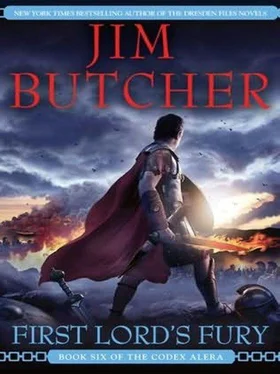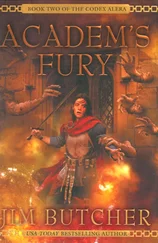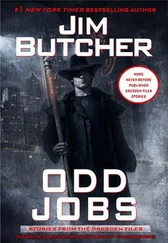“Only to learn how pointless it is to try,” Invidia replied, her voice tired.
“There is without question emotion like our own inside you. But you do not feel it in the same way we do. It does not influence your decisions or judgment.” She stared at Isana without any emotion showing on her face or in her manner, and said, “Believe me. I’ve tried. It is already over, Isana. If you would reduce the pain and suffering our people experience, you should advise them to surrender.”
“They would not listen,” the Queen said dismissively. “And besides, I’m not letting her go.”
Invidia frowned. “Then I see no value in keeping her—or her lover—alive.”
“Let us say that it is for the good of the Aleran people,” the Queen said.
Isana jerked her gaze from the treacherous High Lady to the Queen. “What?”
The Queen shrugged a shoulder, a gesture Isana found somehow familiar and intensely uncomfortable. “The Aleran people suffer because they fight. They will never surrender the fight so long as Gaius Octavian is alive. Gaius Attis might give them the ability to resist, for now—but he is a pretender, and your people know it. So long as the true heir to the House of Gaius walks the land, there will always be many who will fight. He must be dealt with.”
The Queen pointed a clawed fingertip at Isana. “Octavian’s mother is in my control. He will be forced to come to me in an attempt to preserve her life. However, by all accounts she has demonstrated irrational resolve in the past. She might destroy herself to prevent Octavian from coming after her—which is why I need the male alive and unharmed. So long as he remains so, she will retain the hope that both of them might escape this place together.”
Isana tried to prevent herself from shivering at the cold, detached calculation in the Queen’s voice, at the calm precision of her logic. She couldn’t.
“I have her,” the Queen said. “Having her will give me Octavian. When he is dead, the rest of Alera will crumble and yield. Better for me and my children. Better for them.”
“Kill them both,” Invidia suggested. “Revenge may draw him to you as surely as concern.”
The vord Queen bared her green-black teeth in a smile. “Ah. His progenitor’s progenitor waited nearly twenty-five years to take his vengeance when the time was right. That bloodline does not seek to redress such imbalances in… what is the phrase? In fire?”
“In hot blood,” Isana said quietly.
“Exactly,” said the vord Queen. She turned to Invidia. “Why are you not in the field?”
“Two reasons,” Invidia said. “First, our spies in Antillus report that Octavian and his Legions marched to the north nearly two days ago.”
“What?” the Queen said. “Where are they now?”
Invidia’s mouth curled into a chilly little smile. “We know nothing more. Your horde arrived at Antillus several hours ago. It has enfolded the city and is taking losses at more than triple the rate of any other besieged city.”
The Queen’s black-jewel eyes narrowed. “Canim conscripts fighting alone cannot put up such resistance.”
“Nasaug’s conscripts have an unusually high degree of training and experience. They are considerably more formidable than the conscripts in Canea,” Invidia said. After the slightest of pauses, she added, “As I warned you.”
The vord Queen’s eyes flashed with silent anger. “Octavian must have some plan for the Shieldwall. It is the only significant structure north of Antillus. I will dispatch airborne warrior forms to patrol the Wall and locate him.”
“The second reason I am here,” Invidia continued, “is because while you have been chatting with the woman who cannot directly harm you, your attention has wavered from the battle. The High Lord and Lady of Placida and my former husband have been freed from the press of the fight to redirect the feral furies we loosed upon them. They have nothing like overt control, but they have driven most of the ferals out of Riva and away from the fleeing civilians. Our own troops are now suffering at least as heavily from their attentions as are the Legions.”
The vord Queen’s eyes widened, and she whirled to stare at Isana.
“I was also hoping,” Isana said mildly, folding her hands in front of her, “to distract your attention from the fight. I thought it might weaken the coordination of your creatures if you weren’t constantly overseeing them.”
The vord Queen’s eyes blazed for a moment, flickering with odd motes of brilliant green light. Then she whirled and strode back into the area from which she had stared at the battle before. “Get back out there. Take my singulares . Find and destroy any High Lord or Lady you can isolate. I will see to it that their attention is directed elsewhere.”
Invidia lifted her chin. “It might be better to accept our losses and plan for the next—”
The Queen whirled, her face suffused with rage, and shrieked in a voice like tearing metal, “FIND THEM!”
The sheer volume of the scream slammed against Isana like a fist, and she staggered back against the wall. She sagged there for a moment, her ears ringing, and felt a trickle of heat upon her upper lip; her nose had begun bleeding.
In the stunned seconds of silence after, she found herself blinking dully, staring at the unmoving Araris, his scarred face slack, his eyes opened and focused—
Isana froze.
Araris met her eyes for an instant, gazing through a murky half inch of croach . Then his eyes flicked down, and back up to hers. Isana glanced down.
She had not before noted that Araris stood with one hand behind his back—where he was, she abruptly realized, clasping the solid steel handle of the dagger secreted beneath his wide belt. Steel, which might be shielding his mind against numbness, against pain, against the disorientation of any toxins within the alien substance, just as it had utterly hidden his emotional presence from Isana’s own senses—and presumably from those of the vord Queen and Invidia Aquitaine.
Araris Valerian, arguably the greatest swordsman of his generation, was not yet out of the fight.
He met her eyes for a breath, winked at her once, then closed them again.
Isana straightened her spine slowly and made sure her emotions and expression were under control as she turned back to face Invidia and the vord Queen.
Invidia was smiling at the Queen, her expression, beneath its chill veneer, balanced between terror and glee. Then she inclined her head and swept out of the chamber.
The vord Queen said, to Isana, “This will only cause more pain.” Then she lifted her face again, and the walls and ceiling of the chamber began to glow once more. “In the end it will change nothing. I will kill Octavian. I will kill you all.”
In the silence that followed, Isana suppressed a surge of fury. How dare she? How dare this creature threaten her son?
No, Isana thought to herself, grimly. No, you won’t.
Riva burned, illuminating the moonless night.
“There’s always a fire,” Amara said, her tone dull. “Why is there always a fire?”
“Fire’s a living thing,” Sir Ehren replied. He stared at the city as Amara did, looking up at it from the plain on its northern side. Refugees streamed past them in a dazed, shambling river, directed by elements of the Rivan civic legion, and flanked by the legionares of Riva. “If you don’t control it, it looks for food, eats, and grows. It’s in every house in the city, and it just takes a moment’s carelessness to set it loose.” He shrugged. “Though I imagine all the feral furies had something to do with it, too.”
Читать дальше











